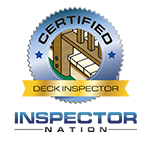My family and I have recently purchased a home this past month, and I had the opportunity to perform the home inspection on it during our due diligence. I had always said that if I purchased a home I would hire another home inspector to do the job. However, when the opportunity came, I just couldn’t put the inspection in anybody else’s hands but mine. So I prepared myself to inspect this home just like I would for any client, trying to be as neutral as possible. I had to throw off any emotional blinders that would get in the way and that would keep me from accepting any reality I discovered. Now that we have closed on the home and have moved in, I would like to reveal something I learned:
I now understand more fully why I have a disclaimer in my contract and report that the inspection is ONLY an evaluation of the condition of the home AT THE TIME OF THE INSPECTION. Let me provide you with two examples from my own experience purchasing a home:
On our closing day, we had the opportunity to go to the house for the first time after the previous owners had moved out. I had asked them to leave the key under the wellhead casing. When I went to find the key, I noticed water was dripping from a union at the wellhead. I had inspected that wellhead during the due diligence, and I know that the drip was not there then. Now I have a leak, and my first thought was to fire my inspector. Then I remembered that it had been a month and a half between the inspection and closing date. Anything can happen between that amount of time. Anything can show up by that time that was not present during the inspection. Fortunately, the fix for this drip was as simple as just tightening the union.
A day later one of my children decided to see how much toilet paper could fit in the toilet and inevitably clogged the toilet. We were still in the middle of moving and did not have a plunger on hand, so we left the clogged toilet for the next day. The next day, while I was waiting for my wife to arrive with a plunger, I decided to give the toilet one more flush to see if it had fixed itself. It quickly began to back up, so I walked away thinking that I would just have to wait for the plunger to arrive. About 15 minutes later, my son came running out of the house yelling, “The bathroom is flooded!” We quickly ran in, and sure enough, there was water in the bathroom that had traveled through the walls to the master bedroom and even into my HVAC return. What had happened? The toilet did not do this when my son first clogged it. Come to find out, the flush handle sticks every now and then and the toilet keeps running as a result. During the inspection, I had flushed the toilet at least a couple times. I always flush the toilet multiple times during an inspection. Never once did I notice that it kept running after the flush. The “now and then” occurrence just did not happen during the inspection. After cleaning up the water with a broom and dustpan, because no mop was available, I assessed the damage and was pleased to see very little. So it wasn’t the major disaster that it looked to be, but it certainly did not help with my opinion of my home inspector.
I have had clients with similar experiences. One had to replace the whole HVAC system not long after moving in. When I inspected it, the system functioned as it should and there were no obvious defects. It was just aged. Whenever a HVAC unit is more than 10 years old, I let buyers know that they should budget for replacement. Another client, on the day he moved in, noticed that none of his receptacles in any of his bathrooms were functioning. In this case, I was able to go to his home and help him find the problem. The problem was a bad GFCI breaker. During the inspection, I trip all bathroom and kitchen receptacles to ensure they trip and reset correctly. I had done the same for this client’s home. However, the defect with the breaker just decided to show up on the day he was moving in.
Conclusion:
When I think about my own experience and the experiences of the above clients after they move in, I wonder how many more clients of mine have stories like this. These stories remind me that home inspectors cannot predict the future. All we can do is evaluate as thoroughly as possible the condition of the home at the time of the inspection, do our best to warn people of possible future problems, and hope that their experience moving in and afterwards is great. However, as any homeowner knows, things break down, and we can’t always predict when. Therefore, do your due diligence and have a home inspection, but understand that the inspection really is only good for the day of the inspection and is not a guarantee that defects will not show up later during and after moving in. I always make myself available for my clients, so if issues arise when they first move in, I can be of some assistance and help in discovering the why and what of the defect. When you really want to know at the time of the inspection, give Duncan Home Inspection Services a call, but please understand that I can’t even predict the future on my own home.






 >
>